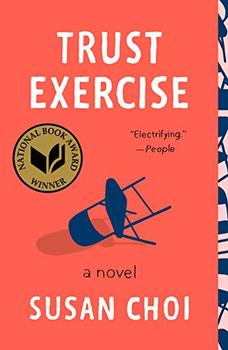Summary | Excerpt | Reviews | Beyond the Book | Read-Alikes | Genres & Themes | Author Bio

A Novel
by Susan ChoiThis article relates to Trust Exercise
 A large part of the later chapters of Susan Choi's Trust Exercise revolves around the publishing of a female narrative of past sexual assault, forcing other characters in the story to reckon with their own complicity in the event (or lack thereof). The empowerment of survivors telling of their own stories is a concept that today's public is very familiar with – the #MeToo movement has garnered significant attention in the past several years because it provides survivors with a safe platform from which to bring their narratives to light and holds perpetrators of their assaults accountable in a public space.
A large part of the later chapters of Susan Choi's Trust Exercise revolves around the publishing of a female narrative of past sexual assault, forcing other characters in the story to reckon with their own complicity in the event (or lack thereof). The empowerment of survivors telling of their own stories is a concept that today's public is very familiar with – the #MeToo movement has garnered significant attention in the past several years because it provides survivors with a safe platform from which to bring their narratives to light and holds perpetrators of their assaults accountable in a public space.
As the movement has gained traction in the public sphere, the tenets of #MeToo have become more obviously noticeable in today's literature. Literature (particularly by female-identifying authors) has long been a means of placing a necessary spotlight on the overlooked suffering of and biases against many groups of people, including women. From Shakespeare's The Taming of the Shrew to Toni Morrison's Beloved, assault is a theme often at the forefront of the literary canon. The pervasive commonality of sexual abuse across centuries of writing is evidence that it has taken far too long to reach a societal point at which survivors can come publicly forward with their stories. However, this type of literature is also exemplary of a space outside of the public sphere in which survivors can tell versions of their stories without fear of personal judgment or repercussion.
By focusing on sexual assault and the deep societal flaws it indicates, literature can provide a means of catharsis that has not always or cannot be found in reality. The act of writing and (in some cases) reading an account that mirrors one's own story has sometimes been the only available option for survivors to find validation in their experiences. The #MeToo movement brings an important focus to the issue of sexual assault and provides an excellent means of survivor validation; however, it is important to remember that these issues existed long before the movement began. The continuing presence of these types of narratives of assault (both physical and mental) is essential in the literature we consume in order to create a safe space through which to empower survivors.
Image from issat.dcaf.ch
Filed under Books and Authors
![]() This "beyond the book article" relates to Trust Exercise. It originally ran in April 2019 and has been updated for the
May 2020 paperback edition.
Go to magazine.
This "beyond the book article" relates to Trust Exercise. It originally ran in April 2019 and has been updated for the
May 2020 paperback edition.
Go to magazine.
Your guide toexceptional books
BookBrowse seeks out and recommends the best in contemporary fiction and nonfiction—books that not only engage and entertain but also deepen our understanding of ourselves and the world around us.